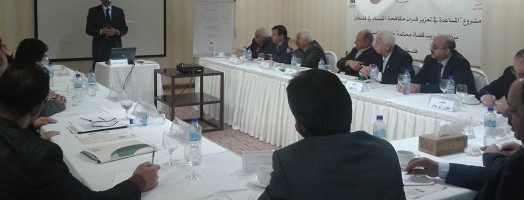Financial Management for NGOs and Financial Legislation
The training is a component of the Anti-Corruption Capacity Building Assistance in Palestine Project, implemented in partnership and cooperation between the IoL and Palestinian Anti-Corruption Commission (PACC), High Judicial Council (HJC) and Public Prosecution. The project is designed to support Palestinian anti-corruption actors and provide capacity building to relevant staff. A total of 15 judges of the Corruptions Crimes Court and other courts took part in the training event.
The training workshop was organised over two days. To provide capacity building to judges to use and analyse NGO financial data as well as to enhance decision making, the first day was designated to training on financial management for NGOs. It included an introduction to the International Public Sector Accounting Standards (IPSAS), classification of financial information, performance analysis, and NGO’s financial positions. In addition to vertical and horizontal analysis of financial data, the training session introduced the use of analysis ratios of NGOs, NGO financial relationships with external actors, use of financial data to monitor NGO sources for protection against irregularities and misuse. With a view to implement remedial measures, the training session addressed how to read periodic financial plans and compare financial projections to actual results. It further covered budget definition, uses and role vis-à-vis historical financial data and relationship with future strategy and plans. The second training day introduced banking laws, Palestine Capital Market Authority (PCMA), and international legal framework regulating money laundering crimes. This second training session elaborated on the role of supervisory bodies and financial institutions in fighting the anti-money laundering activity as well as the respective role of PACC Financial Monitoring Unit. In addition to the Palestine Monetary Authority, including monitoring powers and mechanisms, the training explicated the PCMA concept and role in the anti-money laundering framework. It also provided an analysis of relevant instructions issued by the National Anti-money Laundering Committee to financial institutions and banks.
The Anti-Corruption Capacity Building Assistance in Palestine Project is implemented over the period from April through late December 2013. Tailored to promote accountability and fight corruption in Palestine, the project is part of a joint programme of the United Nations Development Programme/Programme of Assistance to the Palestinian People (UNDP/PAPP) and EUPOL COPPS.






